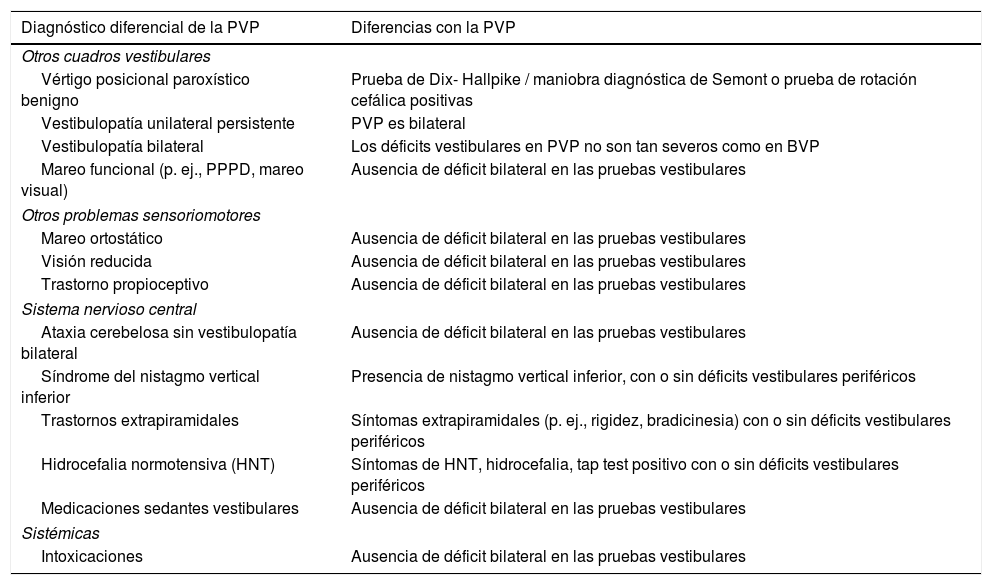
Este artículo describe los criterios diagnósticos de presbivestíbulopatía (PVP) del Comité de Clasificación de la Sociedad Bárány. Se define la PVP como un síndrome vestibular crónico, caracterizado por inestabilidad, alteración de la marcha, y/o caídas recurrentes en presencia de déficits vestibulares bilaterales leves, con hallazgos en las pruebas de función vestibular situados entre la normalidad y los límites establecidos para la vestibulopatía bilateral. El diagnóstico de PVP se basa en la anamnesis, la exploración clínica y la evaluación mediante pruebas de función vestibular. El diagnóstico de PVP requiere una reducción bilateral de la función del reflejo vestíbulo-ocular (RVO). Esta puede ser diagnosticada mediante el video-HIT (vHIT) para el rango de frecuencias altas del RVO; para el rango de frecuencias medias con la prueba de la silla rotatoria; y para el rango de bajas frecuencias mediante la prueba calórica. Para el diagnóstico de PVP, la ganancia de RVO angular horizontal debe ser en ambos lados < 0,8 y > 0,6, y/o la suma de las velocidades pico máximas de fase lenta del nistagmo calórico, tras estimulación con agua caliente y fría en cada lado, que debe estar entre < 25°/s y > 6°/s y/o la ganancia del RVO angular horizontal debe estar entre > 0,1 y < 0,3 con la estimulación sinusoidal en silla rotatoria. La PVP habitualmente ocurre junto con otros déficits relacionados con la edad que afectan a la visión, propiocepción, y/o de las funciones corticales, cerebelosas y extrapiramidales que también contribuyen y que podrían incluso ser necesarias para la manifestación de los síntomas de inestabilidad, alteración de la marcha y caídas. Estos criterios consideran simplemente la presencia de estos síntomas en adultos mayores, junto con el deterioro documentado de la función vestibular.
This paper describes the diagnostic criteria for presbyvestibulopathy (PVP) of the Classification Committee of the Bárány Society. PVP is defined as a chronic vestibular syndrome characterized by unsteadiness, gait disturbance, and/or recurrent falls in the presence of mild bilateral vestibular deficits, with findings on laboratory tests that are between normal values and the thresholds established for bilateral vestibulopathy. The diagnosis of PVP is based on patient history, bedside examination, and laboratory evaluation. The diagnosis of PVP requires bilaterally reduced function of the vestibulo-ocular reflex (VOR). This can be diagnosed for the high frequency range of the VOR with video-HIT (vHIT), for the middle frequency range with rotary chair testing, and for the low frequency range with caloric testing. For the diagnosis of PVP, the horizontal angular VOR gain on both sides should be < .8 and > .6, and/or the sum of the maximal peak velocities of the slow phase caloric-induced nystagmus for stimulation with warm and cold water on each side should be < 25°/s and > 6°/s, and/or the horizontal angular VOR gain should be > .1 and < .3 upon sinusoidal stimulation on a rotatory chair. PVP typically occurs along with other age-related deficits of vision, proprioception, and/or cortical, cerebellar, and extrapyramidal function which also contribute to and might even be required for symptoms of unsteadiness, gait disturbance, and falls to manifest. These criteria simply consider the presence of these symptoms, along with documented impairment of vestibular function, in older adults.






